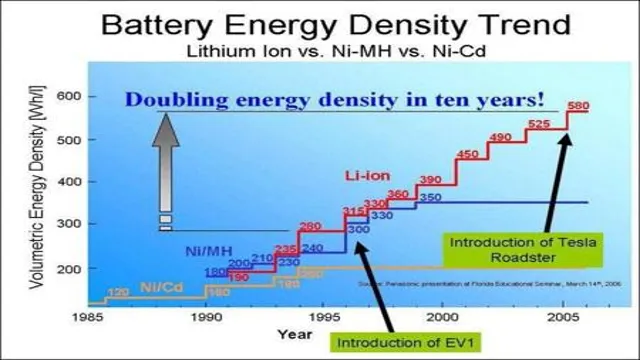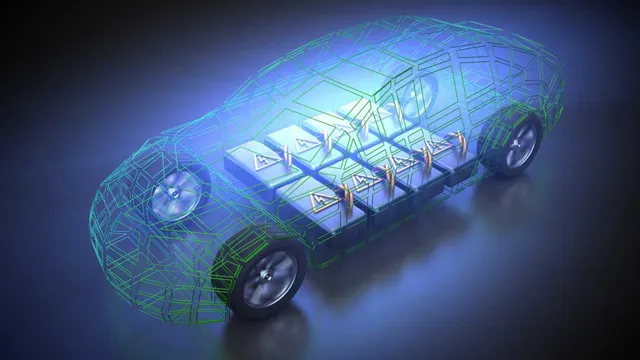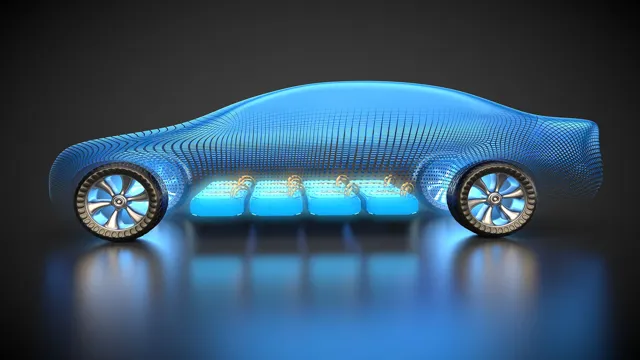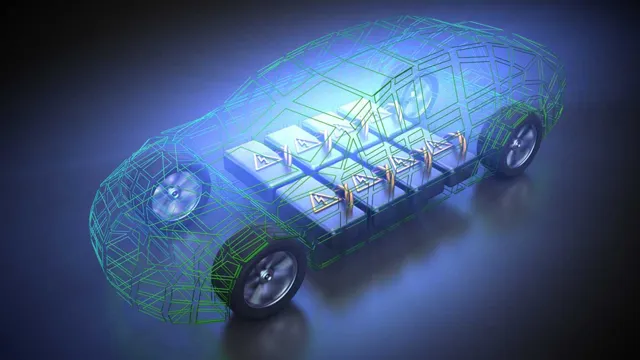Revolutionizing the Future: The Power-Packed Potential of Electric Car Battery Power Density
Have you ever wondered about the technology that powers the electric cars of today? Electric vehicles have battery packs that store energy to power the electric motor, and battery power density is a crucial aspect of the technology. But what exactly is battery power density, and why is it important for electric cars? In simple terms, battery power density refers to the amount of energy that can be stored in a battery per unit of volume or mass. In the case of electric cars, the higher the battery power density, the further the vehicle can travel on a single charge.
This is because a higher battery power density means more energy can be stored in the same physical space, allowing for a longer driving range. The race towards developing electric car battery technology with higher power density is ongoing as car manufacturers aim to compete in the market, and more importantly, create sustainable vehicles. With an increasing focus on renewable energy, sustainable materials, and reducing carbon emissions, the development of advanced batteries with higher power density is crucial for the growth of the electric vehicle industry.
In this blog, we’ll dive deeper into the concept of electric car battery power density, its significance in the world of EVs, and how it can impact the future of the automotive industry. We’ll also explore some of the newest battery technologies being developed and their potential to revolutionize the way we look at battery-powered vehicles. So, let’s unlock the world of battery power density and discover how it’s driving innovation in the world of electric cars.
What Is Power Density?
Electric car battery power density is a vital metric used to measure the amount of energy that can be stored in a given battery unit. Put simply, it is a measure of how much power (in watts) a battery can deliver per unit of weight (in kilograms) or per unit of volume (in liters). The higher the power density, the lighter and more compact the battery can be, while still delivering the energy needed to power an electric vehicle for an extended period.
This is critically important for electric vehicle design because a higher power density means smaller and lighter batteries, which in turn translate to increased driving range, lower manufacturing costs, and improved overall battery performance. As electric vehicle technology continues to advance, the race to develop batteries with increasingly higher power densities intensifies, with many experts predicting significant breakthroughs in the field in the near future.
Defining battery power density and its importance in electric cars.
Power density is a measure of how much power can be stored in a given volume or mass of a battery. In other words, it is the ratio of a battery’s power output to its weight or volume. High power density is crucial for electric cars, as they require a significant amount of energy to operate.
The higher the power density of a battery, the longer the car can travel on a single charge. Essentially, power density is the key to making electric cars competitive with gasoline-powered vehicles. It is the reason why Tesla has been so successful; they have managed to create batteries with high power density, allowing their cars to travel further on a single charge than any other electric car on the market.
In short, power density is critical to the success of electric cars, and it will continue to play a vital role in their widespread adoption.
Current State of Electric Car Batteries
Electric car batteries are rapidly advancing in terms of power density, which refers to the amount of energy that can be stored in a battery per unit of volume or weight. This allows for longer driving ranges and faster charging times, making electric cars more practical and convenient for everyday use. Currently, lithium-ion batteries are the most commonly used type of battery in electric cars, but researchers are constantly exploring new materials and technologies to improve their performance and durability.
Some companies are even experimenting with solid-state batteries, which could offer even higher power densities, longer lifetimes, and improved safety. As electric cars become more popular and the demand for better batteries increases, we can expect to see continued advancements in this technology that will make electric cars an even more attractive option for consumers.
Overview of power density in current electric cars and average range.
Electric car batteries have come a long way in recent years, with an increased focus on power density and range. Power density refers to how much power can be packed into a specific amount of battery space. The average power density for current electric car batteries is around 250 watts per kilogram, with some models exceeding 300 watts per kilogram.
This means that electric cars are becoming more efficient and powerful, with faster acceleration and longer ranges. Speaking of range, the average electric car currently on the market can travel around 250 miles on a single charge. This might not seem like much compared to the range of a traditional gas-powered car, but it’s a significant improvement from just a few years ago.
As technology continues to improve, we can expect to see even better power density and longer ranges in electric cars.
Comparison of power density between electric cars and traditional gas-powered cars.
Electric cars are becoming more and more popular these days, and part of the reason why is the impressive technology behind the batteries that power them. The current state of electric car batteries is such that they have a significantly higher power density than traditional gas-powered cars. This means they can store more energy in a smaller amount of space, making them incredibly efficient and eco-friendly.
The emergence of electric cars has revolutionized the way we think about transportation and has ushered in a new era of sustainability. As we continue to develop more advanced batteries, it’s likely that electric cars will become even more ubiquitous in the years ahead.
Factors That Affect Power Density
When it comes to electric car battery power density, there are several factors that come into play. First and foremost, the chemical composition of the battery cells themselves is the most significant factor in determining power density. The specific materials used in the battery chemistry can significantly affect the amount of energy that can be held within a given volume.
Second, temperature can also have a significant impact on power density, as colder temperatures can decrease the overall output of the battery. Additionally, the way that the battery is designed and engineered can play a role in power density as well. For example, the overall size and shape of the battery can impact how much energy it can store and how much power it can deliver.
Ultimately, a combination of these various factors will determine the power density of an electric car battery, and improving any or all of them will be key to advancing the capabilities of electric vehicles moving forward.
Exploring the impact of temperature, weight, and chemistry on battery power density.
Power Density When it comes to batteries, power density refers to the amount of energy that can be stored per unit volume or weight. This is a crucial factor when it comes to battery performance, and several elements can impact it. For instance, temperature can significantly affect power density.
Most batteries perform best at moderate temperatures, which means that extreme heat or cold can diminish the battery’s performance. Additionally, the weight of a battery can affect its power density. Generally, lighter batteries tend to have higher energy density, making them a popular choice for portable devices.
Finally, the chemical composition of a battery can also impact its power density. Batteries made with more advanced chemistries tend to have higher energy densities but may come at a higher cost. With all these factors in mind, it’s essential to choose the right battery for an application as the best choice will depend on the specific requirements.
Advancements in Battery Technology
Electric car battery power density has been one of the biggest areas of research and development in the field of battery technology. In recent years, tremendous advancements have been made in improving the power density of electric vehicle batteries. The high power density of a battery is essential for the overall performance of an electric vehicle.
With the advancement of nanotechnology, many researchers are developing new battery technologies that promise to deliver higher power density, longer life, and faster charging times. The development of solid-state batteries has also been a significant breakthrough that holds promise for electric vehicles in the future. As consumers demand greater efficiency and affordability, electric vehicle battery technology will continue to evolve, with increased power density being a major driver for innovation.
Electric car manufacturers are actively working to develop and test new battery technologies that can handle greater power demands, charge faster, and have longer lifespans.
Innovations in battery technology and their potential impact on power density.
Advancements in battery technology are rapidly changing the energy storage game, with improvements in power density and efficiency being key. From lithium-ion to solid-state batteries, these innovations are enabling longer lasting and more powerful energy solutions. For example, solid-state batteries have the potential to be safer, more energy-dense, and have a faster charging time than conventional lithium-ion batteries.
This would mean longer-lasting electric vehicles, more efficient renewable energy storage, and even better portable electronics. These changes could revolutionize the way we power our lives, reducing our reliance on fossil fuels and helping to meet our energy demands in a more sustainable way. As these advancements continue, it will be exciting to see the potential impact on the future of energy and the environment.
Examples of electric cars with high power density batteries.
Advancements in Battery Technology Electric cars have been gaining popularity in recent years due to their environmental benefits and increasing affordability. One of the most significant advancements in electric car technology has been the development of high-power density batteries. These batteries are capable of storing more energy per unit of weight and volume, allowing for longer driving ranges and faster charging times.
Several electric car manufacturers have already incorporated high-power density batteries into their models, including Tesla’s Model S, the Porsche Taycan, and the Audi e-tron. These cars can travel hundreds of miles on a single charge, making them a feasible option for long drives. Additionally, the batteries can be charged in a matter of minutes rather than hours.
Advancements in battery technology are improving the overall driving experience of electric cars, bringing them closer to matching the convenience and practicality of gas-powered vehicles.
Future of Electric Car Batteries
The future of electric car batteries is looking bright as advancements in technology continue to increase power density. This means that batteries can hold more energy in the same amount of space, providing longer ranges for electric vehicles. With power density being a crucial factor for EVs, several companies are investing in research and development to improve this aspect of EV batteries.
With new materials and manufacturing processes, electric car batteries can eventually match the energy density of gasoline, eliminating range anxiety for drivers. As electric vehicles become more popular, the demand for powerful, longer-lasting batteries will only increase, prompting further innovation in the field. Overall, the future of electric car batteries looks promising, and with continued investment in research and development, they could eventually become the norm on our roads.
Predictions for the future of battery power density and its role in electric car adoption.
The future of electric car batteries is exciting, with new developments bringing increased power density and playing a crucial role in the adoption of these vehicles. Batteries are an essential component of electric cars, providing the energy required for movement. The advancement of battery technology is leading to more extended range and faster charging times, making electric cars more convenient and practical for daily use.
Power density is critical in electric car batteries as it directly affects the vehicle’s performance. Scientists and engineers are continually working on developing more efficient and powerful batteries, and with advancements in battery chemistry and materials, the future looks promising. As battery power density increases, we can expect to see more affordable electric cars with longer ranges, further reducing the world’s dependence on fossil fuels.
The technology is advancing rapidly, and we can’t wait to see what’s next for electric car batteries.
Conclusion
In conclusion, the power density of an electric car battery can be compared to the caffeine content in your morning coffee. Just like how a strong cup of coffee can give you the energy to power through the day, a high power density battery can give your electric car the energy it needs to travel further and faster. So next time you hit the road in your electric vehicle, raise a cup of coffee and toast to the power of density – both in your battery and your beverage!”
FAQs
What is meant by electric car battery power density?
Electric car battery power density denotes the amount of energy that can be stored per unit of weight or volume in an electric car battery.
How does higher power density in electric car batteries benefit car owners?
Higher power density in electric car batteries results in longer driving range between charges, faster charging times, and lighter weight of the battery, which can improve the overall performance of the car.
What factors affect the power density of electric car batteries?
Factors affecting the power density of electric car batteries include the chemistry of the battery, the size and shape of the battery cells, the manufacturing process, and the thermal management system of the battery.
How are car manufacturers working to improve the power density of electric car batteries?
Car manufacturers are investing in research and development to improve the chemistry of the battery, optimize the design and manufacturing process, and develop better thermal management systems to improve the power density of electric car batteries. Some manufacturers are also considering the use of solid-state batteries that can provide higher power density compared to traditional lithium-ion batteries.





